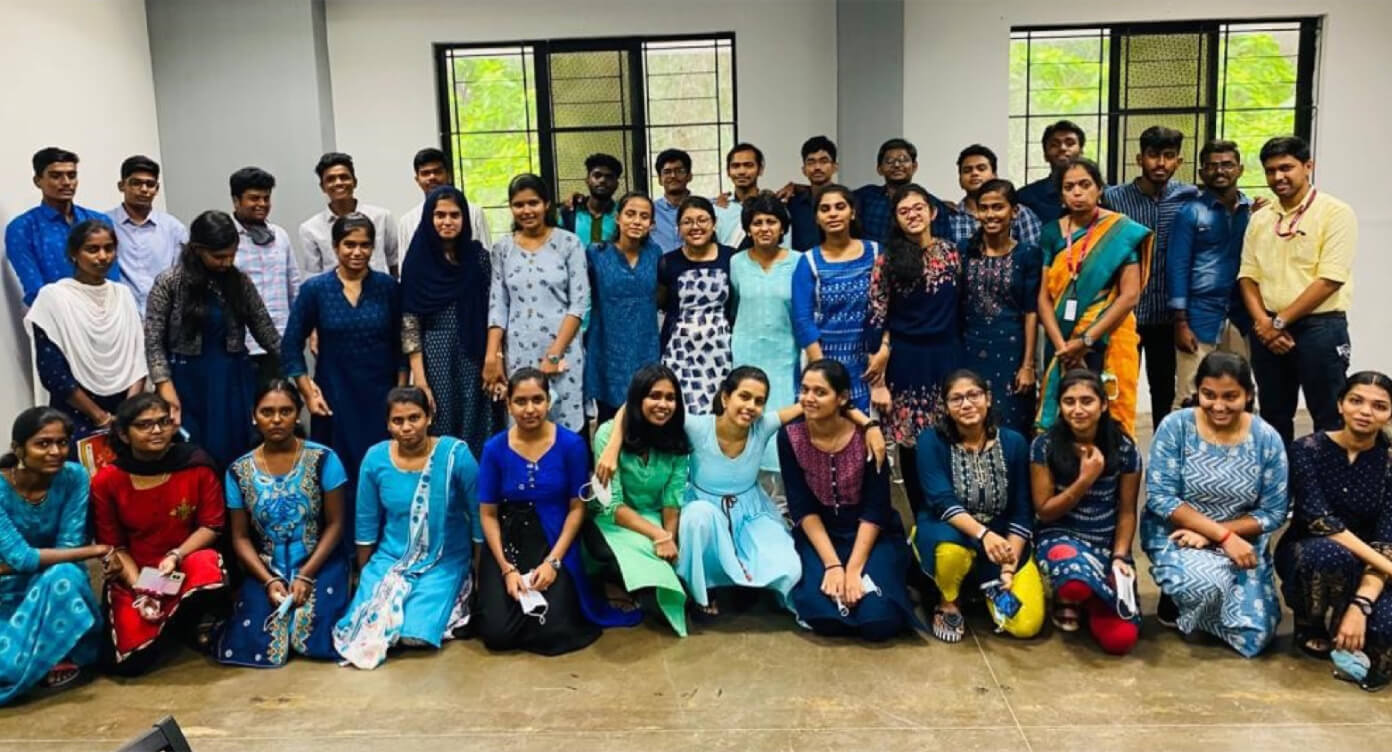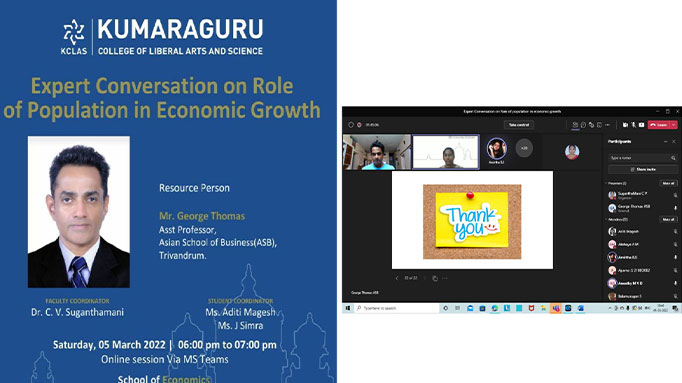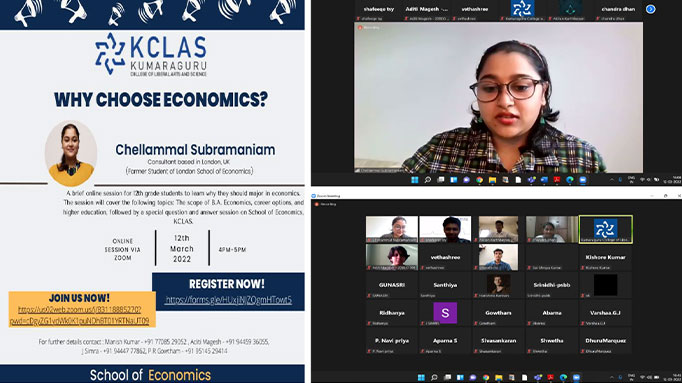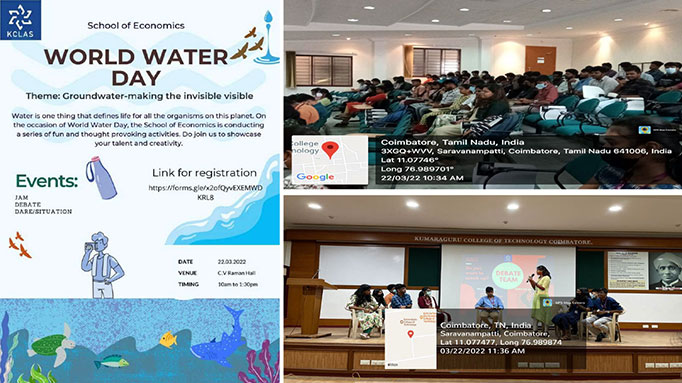Expert Conversation on the topic “’Studying Economics Abroad: Vocation and Scope”
Summary of the Event:
The School of Economics organised an Expert conversation on “Studying Economics Abroad: Vocation and Scope” on 28th January 2022. A total of 27 students attended the session, which was open to all students in the Economics Department. Ms. Chellammal Subramaniam, Consultant based in London, UK and a former student of LSE, London, UK was the resource person for this expert conversation. The expert conversation is mainly intended for the students to learn various higher studies opportunities available in eminent institutes in India and abroad; how to prepare themselves during application process and how to apply for funding at various national and international organisations. The speaker elaborated on how to apply and the prerequisites for higher studies, summer schools and internships in various international institutes especially London School of Economics. At the end of the session, students actively involved in question-answer session and clarified their doubts with the speaker.
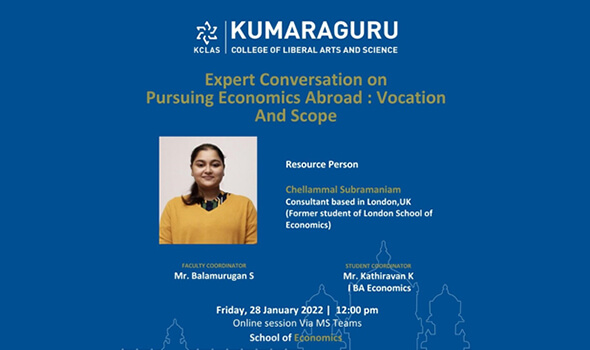
Outcome of the Event:
The expert conversation enabled students in gaining knowledge on how to prepare for their future academic track in world renowned institutes.
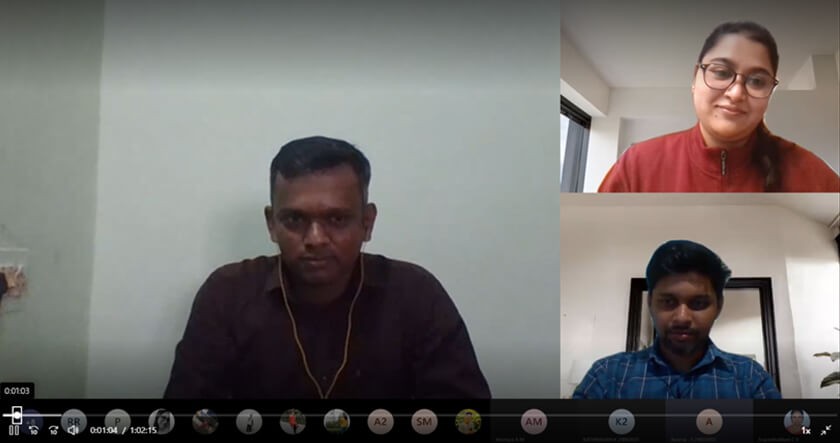
Quiz Contest- Economind
Summary of the Event:
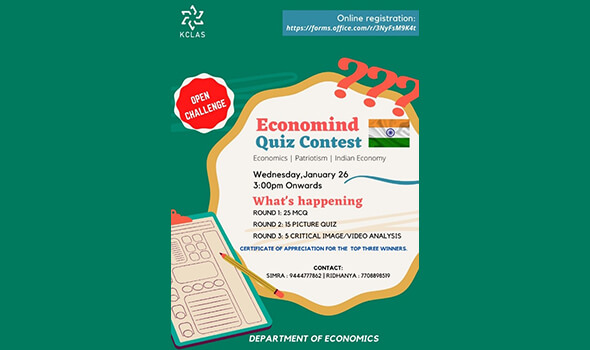
On January 26th,2022, the School of Economics celebrated Republic Day by organizing a quiz contest called Economind on patriotism, economics, and the Indian economy. A total of __ people attended the event, which was open to all students in the economics department as well as other KCLAS departments. A formal welcome address to the participants kicked off the event. Following that, the quiz had three rounds. The organizers provided a link for participants to answer 25 multiple-choice questions in the first round. The second round consisted of 12 fun picture quizzes that the participants actively answered. The third round consisted of a picture and video analysis, with participants being asked to share their thoughts and opinions. Participants offered a variety of viewpoints, and everyone gained something new from this round. Finally, the participants were asked to provide feedback on the event, and the session came to a close with a quick vote of thanks.
Outcome of the Event:
This event provided participants with a wealth of information about India, the Indian economy, and various economic concepts.

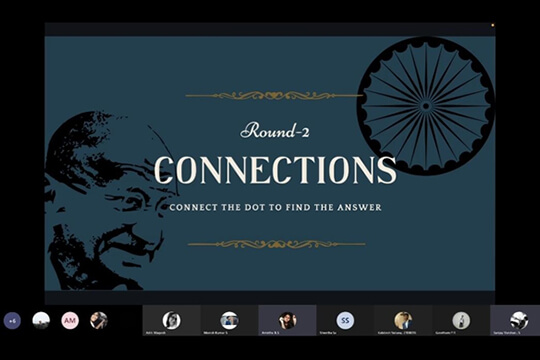
STUDENT CORNER
Ms. Paridhi Modi of II B.A. Economics participated “the Novice Summit 3.0” conducted by the Youth of India and UN information centre of India and Bhutan on 22/01/2022.
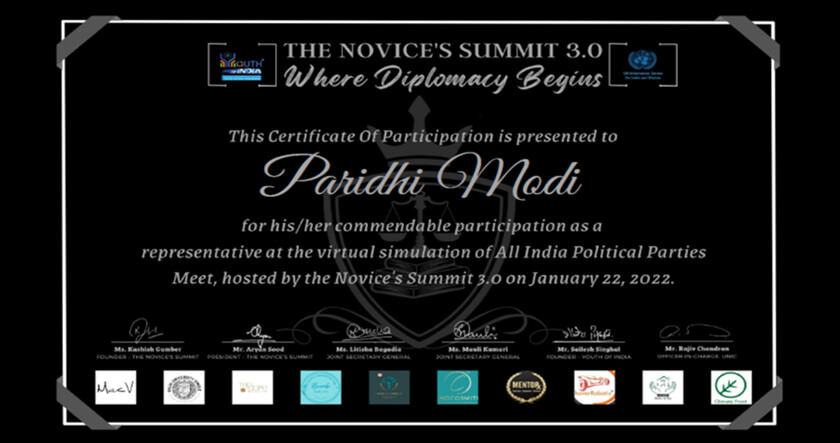
Ms. Keerthana and Mr Sanjay Varshan completed online courses on Principles of Management and The Business Intelligence Analyst Course 2022 respectively in the month of January 2022.
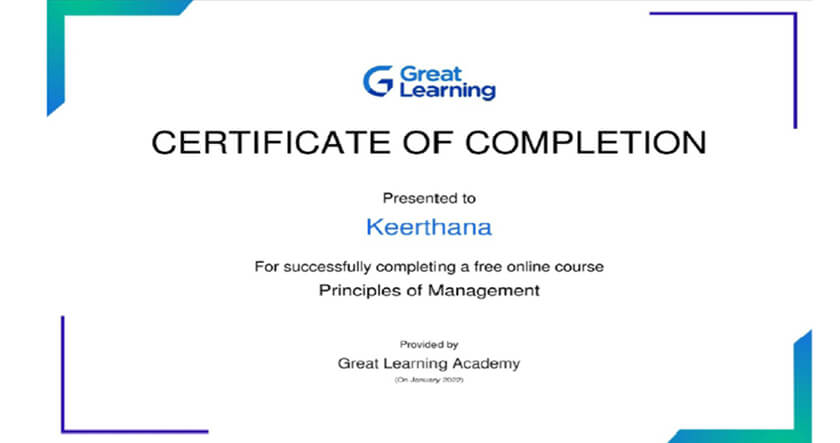

EXPERT CONVERSATION
| Topic | Basics of Regression Analysis |
|---|---|
| Resource person | Mr. Karthick V, Research officer, Fiscal Policy Institute, Bengaluru, Karnataka |
| Venue | Online, MS Teams |
| Date | 23rd December, 2021 |
| Time | 07:00pm to 08:00pm |
| Faculty | Mr. Shafeeqe Abdul Kader P K |
| Number of participants | 35 |
Regression analysis is a collection of statistical methods for estimating the relationships between dependent and independent variables. Learning Regression Analysis can help you comprehend statistical inference in general. Regression analysis is more versatile and has a wider range of applications. It is also less of a black box and easier to describe. The meaning, definition, formulas, types, and examples of regression analysis were highlighted by the speaker. There were also insights into the importance of Regression Analysis as well as its limitations. Lastly, the expert conversation ended with a question-and-answer session during which the students actively participated in asking questions on the topic.
The expert conversation provided students with a thorough understanding of the fundamentals of regression analysis, including formulas, significance, types, and applications.

SKILL ENHANCEMENT SESSION ON “ART OF SPEAKING”
| Topic | Art of Speaking |
|---|---|
| Resource person | Ms. Hemapriya Kc South Indian Master Trainer, GKC Edutainment, Coimbatore |
| Venue | Online, MS Teams |
| Date | 17thdecember, 2021 |
| Time | 11:30 pm to 12:30 pm |
| Faculty | Dr. C.V. Suganthamani |
| Number of participants | 38 |
Ms. Hemapriya Kc, South Indian Master Trainer, GKC Edutainment, Coimbatore, was the resource person for this Skill Enhancement Session.
The speaker emphasized the necessity of good communication skills. All of us dream about giving a speech that receives applause, but the fear of missing a line or stammering may instantly diminish any excitement. At some moment in time, we may be bound to encounter reality and deliver a speech in front of a public. As a result, it is vital to learn the art of speaking as well as the skills so that you are not limited by fright and may excel in a variety of circumstances.
The discourse centred on what speaking skills are, why they are essential, and how to improve them, and ended with a question-and-answer session in which the participants actively participated in asking questions about the talk.
The skill enhancement session gave an in-depth grasp of the importance and value of the art of speaking. There were also insights into how to develop communication skills.

NATIONAL FARMER’S DAY EVENT
| Topic | National Farmer’s Day |
|---|---|
| Venue | LH 2 |
| Date | 23rd December, 2021 |
| Time | 1:45 pm |
| Faculty | Dr. C.V. Suganthamani |
| Number of participants | 30 |
Kisan Diwas, or National Farmers Day, is held across the country on December 23 to honor the farmers, who are India’s backbone. The date was chosen to commemorate the birth anniversary of India’s fifth Prime Minister, Choudhary Charan Singh. This day was observed by the Economics Department with a few meaningful, interesting, and educational activities.
The event began with a formal welcome address to the attendees, followed by a silent prayer for the farmers who died during the protest. The event featured a short film, a small skit, and an oath-taking session among other things. Participants enthusiastically participated in all activities and gained so much knowledge. Lastly, a vote of thanks was delivered to conclude the event.
Participants recognized farmers’ dedication and sacrifice and learnt the significance of protecting their social and economic well-being.

AWARENESS PROGRAM ON HEALTH AND WELL BEING:
On December 6th ,2021, The school of Economics held a program related to social issues “Health and Well-Being” in LH 17 .An insightful programme was conducted by the department with the integration of both seniors as well as juniors. This programme directed its focus on awareness of being strong both mentally and physically. It laid strong emphasis on the topic of sanitation, mental and physical well-being. The programme began with the announcement regarding the importance of mental, physical, social well-being of an individual in a society. The programme then went on with the explanation of the importance of general health and proper sanitation, also there was an inclusion of the topic about proper disposal of waste. In this programme we were also able to witness the measures taken by the UN to ensure reduction of inequality and promote well-being.
Furthermore, the topic stretched towards the Terror of 20th century “COVID-19”. The programme holistically covered the effects caused by the COVID-19, how to carry on with our life, the measures to keep our mental well-being in shape and as well as our physical health.
The bottom line is that a strong emphasis should be laid on our health and keep it a top priority as it’s one which helps us carry forward in our life no matter what.

CERTIFICATE COURSE PROGRAM ON ADVANCED EXCEL
The certificate course for the first semester of Batch 2021 on “Advanced Excel” started on 20th December through offline mode. The course was delivered by Synergy School of Business Skills which covered on several short cut keys, formulas, and functions that would be time saving as well as useful when it comes to the analysis of data. Overall, it was a very insightful and beneficial course that was not just academically valuable but also a skill enhancement course.

Workshop on the topic Basic Analysis of Economic Data
The department of economics organized an online workshop on Basic Analysis of Economic Data on November 2nd, 2021. The workshop was open to students from the economics department as well as students and faculty from other KCLAS departments, with a total of 50 people in attendance.
The resource person for this workshop was Dr. Elumalai Kannan, Associate professor in Economics, Centre for the study of Regional Development (CSRD), School of Social Sciences (SSS) in Jawaharlal Nehru University, New Delhi. He assisted the participants in developing a critical analysis approach to data, allowing them to achieve the desired outcomes in their economic studies.
Only through the use of data can economic concepts be critically interpreted. The role of data in validating theories and concepts is critical. Macroeconomic variables are given extra weight in research, and the skills required to gather this data are in high demand. This workshop gave students a thorough understanding of working with time series data, functional forms, trend analysis and the interpretation and computation of growth rates.
The workshop came to a close with a question-and-answer session in which the attendees actively participated in asking their questions.
The concept of trend analysis was discussed in this workshop, which assisted participants in calculating growth rates and other macroeconomic indicators, as well as critically evaluating existing economic models.
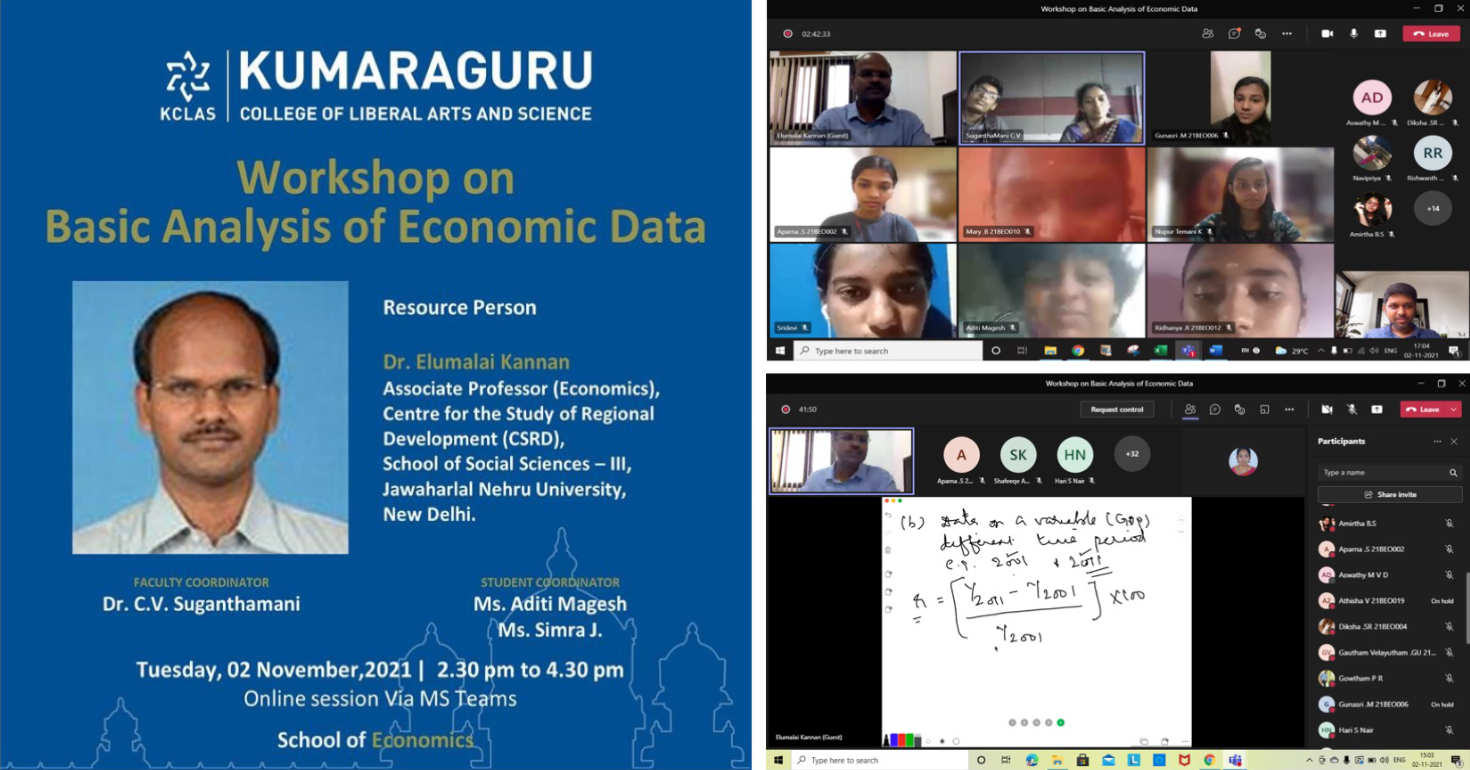
Expert Conversation on Alternative approaches to Value and Distribution
On November 10th, 2021, the school of Economics held an online expert conversation on alternative approaches to value and distribution. A total of 68 people attended the expert conversation, which was open to all students in the economics department as well as other KCLAS departments.
Dr. Heinz Kurz, Professor, The Graz Schumpeter Centre, Department of Economics, University of Graz, Austria, was the resource person for this expert conversation.
Different approaches to value and distribution were debated. The main themes of the talk are the disparities in approaches to explaining the distribution of income and relative prices, and thus disparities in approaches to all other economic problems, particularly capital accumulation and economic growth. In an era of economic crisis, the discipline’s future is far from certain, so it is critical to revive these debates by reproducing them together for the first time.
Classical political economy’s method, analytical structure, and content were also discussed. The discussion focused on what they have in common, particularly in the theory of value and distribution.
The session concluded with a question and answer session in which the participants actively participated in asking questions about the talk.
The expert conversation provided a thorough understanding of the value and distribution theories, as well as various approaches to them. There were also insights into classical political economy.
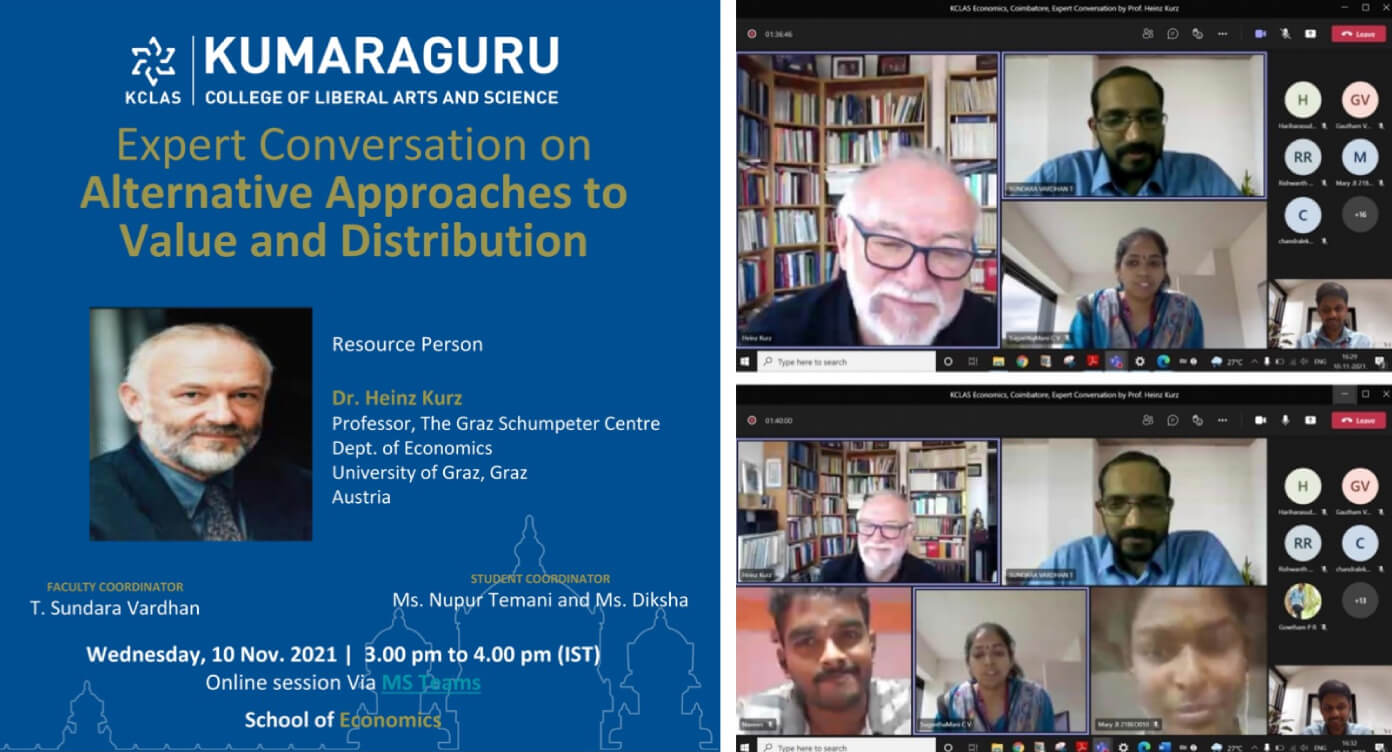
Workshop on Agricultural Credit in India
Indian economy is called as an agrarian economy since majority of its population is dependent on agriculture and other agrarian activities. And like in any other industry, finance is an important component in agricultural industry as well. This workshop on Agricultural Credit in India – An overview, which started with the basics of agricultural credit slowly picked up pace to focus on the framework of agricultural credit in India.
The workshop focused on the agricultural credit facilities and its availability in India, the conditions and factors influencing the same in India – which forms an integral part of the economy.
Overall, the workshop enabled a clearer understanding of the practical aspects of agricultural credit that the students have learned.
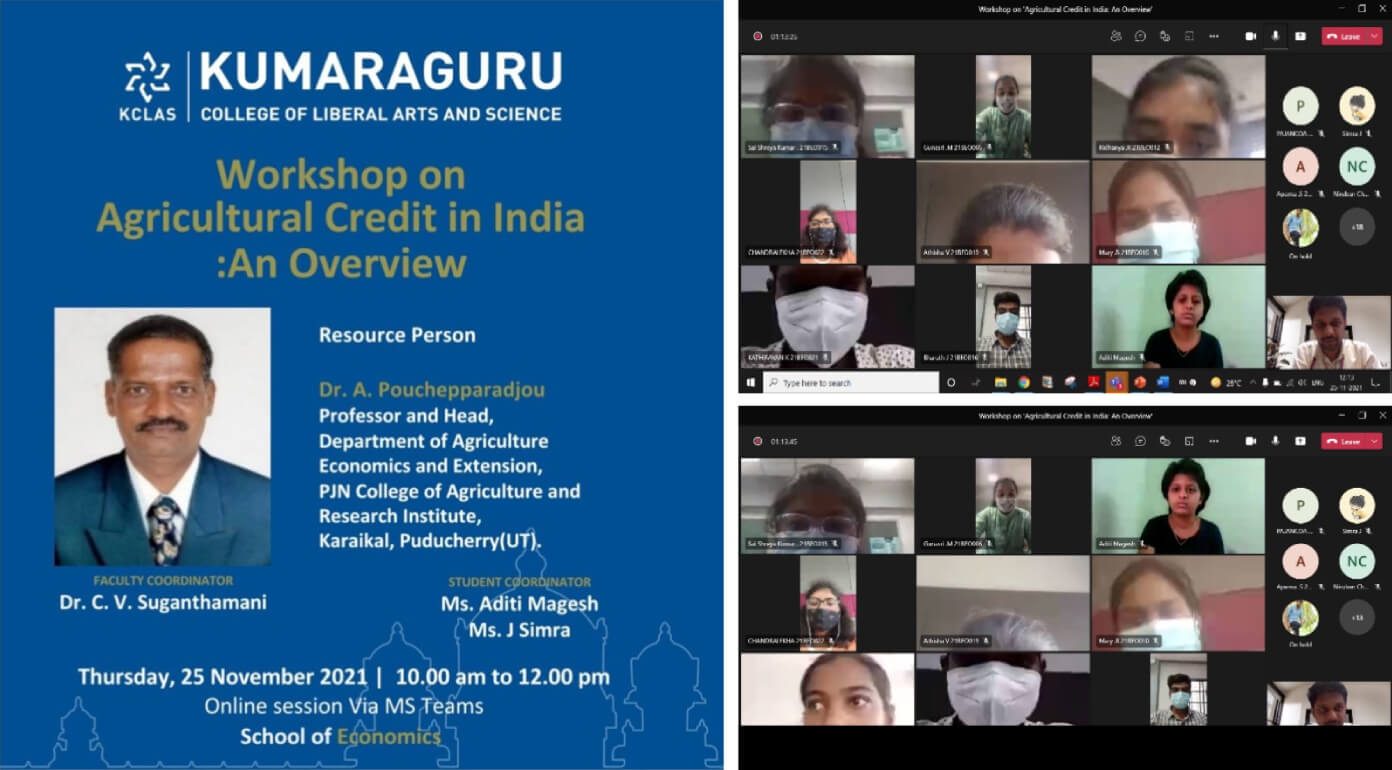
Icebreaker Session Aragma
The School of Economics held an icebreaker session called ARAGMA on November 9th, 2021, in which both second and first years, as well as faculty, participated. It was a short but fruitful session in which participants got to know one another better. With only a year and a half left, this was the first step by the second-year students to get to know their juniors and make memories with them.
The session began with a greeting and welcome message to the participants. The participants were then given the opportunity to introduce themselves to the rest of the group.
Participants made new friends and created sweet memories during the session. The ARAGMA was then wrapped up with a photoshoot.
The session helped participants get to know one another, break down social barriers and build rapport.
